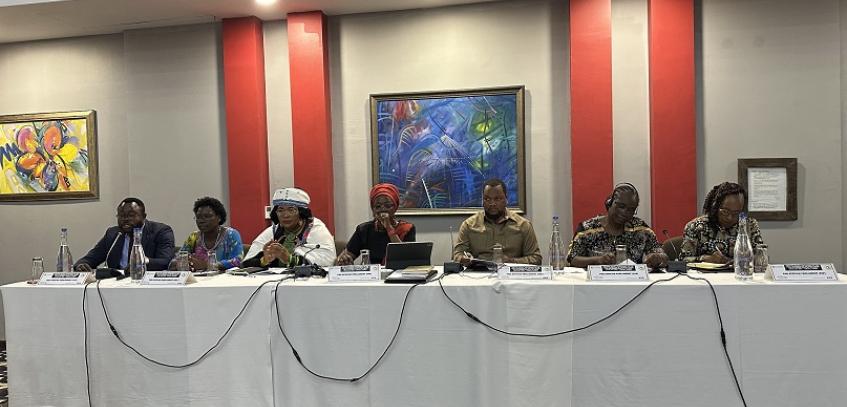The Pan-African Parliament (PAP), through its Permanent Committee on Gender, Family, Youth, and People with Disability, has concluded a three-day engagement with Civil Society Organizations as part of the formulation process of a Model Law on Gender Equality. The engagement was held from 3 to 5 July 2023 in Lusaka, Zambia, in collaboration with the Economic, Social & Cultural Council of the African Union (ECOSOCC).
The Consultation brought together Members of the PAP Committee on Gender, Family, Youth and People with Disability, Parliamentarians from the Republic of Zambia, Representatives of the ECOSOCC and the African Commission on Human and Peoples’ Rights, and representatives of Civil Society Organisations from Zambia and Southern Africa with the aim of ensuring that the legal and policy framework on the Model Law on Gender Equality and the Draft Model Law itself incorporates the views and aspirations of the people of Africa, in line with the mandate of the Pan-African Parliament.
Deliberations with Civil Society Organizations focused on the key thematic areas to be covered by the proposed Model Law on Gender Equality and Equity. These areas include women’s access to land, education, employment and equal remuneration, social protection, political participation as well as participation in decision-making processes. The three-day consultation resulted in various proposals and recommendations for consideration by the PAP Committee on Gender, Family, Youth, and People with Disability in the draft of the legal and policy framework of the Draft Model Law on Gender Equality and Equity.
Detailing the next steps, Hon. Miriam Dao Gabala, Chairperson of the Committee described the consultative process as critical in promoting the Model Law and enabling grassroots organizations to partake in Parliament’s and ultimately the African Union’s decision-making processes. She praised Civil Society Organizations for their valuable input and the open-mind approach they displayed throughout the exercise.
“The pilot Civil Society Engagement in Southern Africa will be followed by consultations with other Civil Society Organizations across the other regions of the continent. The feedback and recommendations gathered through these consultations will be incorporated into the legal framework of the draft model Law. The ultimate stage will be the adoption of the Model Law by the Plenary of the Pan-African Parliament. The consultations will also serve as a platform for awareness about the significance of effective implementation of the Maputo Protocol and its incorporation into domestic legal frameworks in relation to safeguarding women’s rights,” said Hon. Gabala.
The Civil Society Engagement on the Draft Model Law on Gender Equality in Lusaka was led by the Pan-African Parliament Committee on Committee on Gender, Family, Youth, Sports and People with Disability, represented by the following members: Hon. Miriam Dao Gabala (Côte d’Ivoire), Chairperson of the Committee); Hon. Pemmy Majodina (South Africa), Member and Chairperson of the Southern African Regional Caucus; Hon. Rachel Yassindali (Central African Republic), Rapporteur of the Committee; Marie Mediatrice Izabiliza (Rwanda), Member; Hon. Anita Ndayizeye (Burundi). The Committee was joined by members of the Zambian delegation to the Pan-African Parliament comprising Hon.Mariam B. Chonya Chinyama; Hon. Menyani Zulu; and Hon.Miles Sampa.
The participating Civil Society Organizations expressed deep appreciation to the PAP and the ECOSOCC for involving citizens and civil society in this important exercise and pledged to stay ready to engage with the process of formulation of the Model Law on Gender Equality and Equity in Africa. Similarly, the PAP delegation, the ECOSOCC, and all participants expressed gratitude to the Government and people of Zambia for their hospitality which permitted the successful holding of the Civil Society Consultation.
As background, in November 2022 the First Ordinary Session of the Sixth Parliament mandated its Committee on Gender, Family, Youth, and People with Disability to pursue a Model Law on Gender Equality in a bid to achieve full gender equality by promoting women’s rights in all areas, and attain the objectives of Agenda 2063 in this area.
This Resolution was taken in the context of the evaluation of the implementation of the African Women’s Decade priority areas, and the realization that despite the popularisation of the Maputo Protocol on Women’s Rights provisions, women still face numerous challenges to reach equality.
The function of the Committee is to consider issues relating to the promotion of gender equality; assist Parliament to oversee the development of policies and activities of the African Union relating to family, youth, and people with disabilities; consider issues relating to the promotion of sports and oversee the development of policies and activities of the Union relating to sports.








